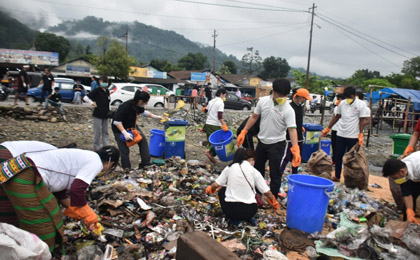RONO HILLS/ROING, May 26: The NSS cell of Rajiv Gandhi University (RGU) in collaboration with the Integrated Mountain Initiative/ Sustainable Development Forum of Arunachal Pradesh (SDFAP) conducted the ‘Himalayan Cleanup Campaign (HCC)-2019’ on the university’s campus on Sunday as part of the cleanup programme which is being conducted across 12 Himalayan mountain states of India.
The volunteers collected waste from different locations
in the campus and conducted waste audit after proper segregation and data tabulation.
RGU Vice Chancellor Prof Saket Kushwaha informed that the university would be completing the green audit of the campus within a year. He said waste management in the university would be “innovatively taken up,” with focus on minimizing the use of plastics.
In order to minimize the use of disposable mineral water bottles, several drinking water facilities are being set up in the university.
Prof Kushwaha shared the vision of having a dedicated ‘mountain enrichment club’ for conducting various activities in the areas adjoining the university, thereby involving the community and students to locate solutions for maintenance of the local ecosystem.
The HCC is an annual event held in May, in conjunction to the theme ‘Our mountains deserve better’, with the objective of focusing attention on the problem of waste in the mountains, specifically single-use plastic waste.
In Lower Dibang Valley HQ Roing, hundreds of volunteers from across the district participated in the HCC.
Roing ADC Tapik Pertin flagged off the programme, and Roing police station OC N Sora initiated the pledge-taking ceremony, encouraging the youths to “embrace sustainability.”
Solid waste weighing 2171.18 kgs was collected from around the Roing market complex. A huge amount of waste, comprising tetra pack packages, tins, textiles, glass and other plastic items were also collected.
Non-branded plastic waste weighing 1076 kgs, and branded mineral water bottles weighing 132.5 kgs were the highest amount of plastic waste found through the brand auditing.
Post collection, waste auditing was carried out by the volunteers under the supervision of Paul Chawang of NGO Amyaa, and others.
The PET bottles were weighed and stored for recycling by the DUDA, while tins and other recyclable waste were offered to local scrap dealers in the town. The remaining discarded garbage was disposed of with transportation facilitated by the DUDA.
The clean-up drive was jointly organized by the district administration, the Amyaa, the SDFAP, the Dibang Development Council Agency, the All Idu Mishmi Students’ Union, and others.


